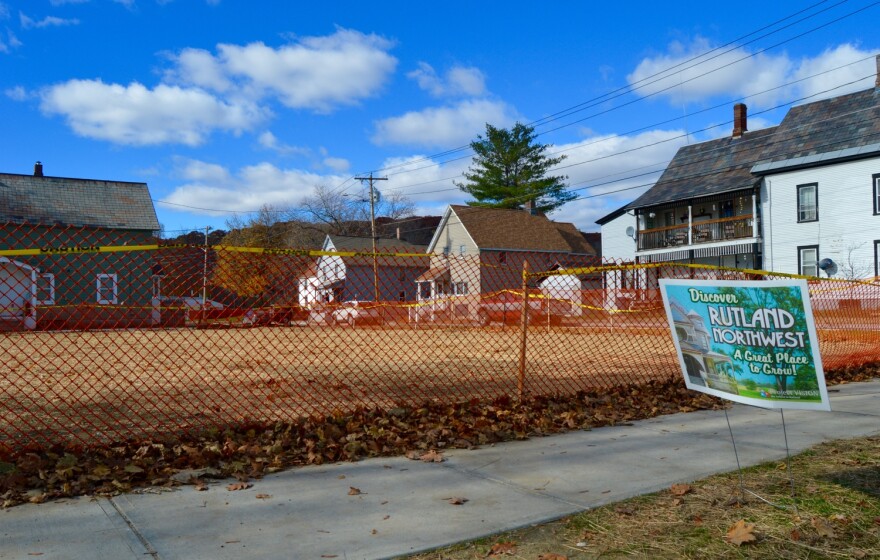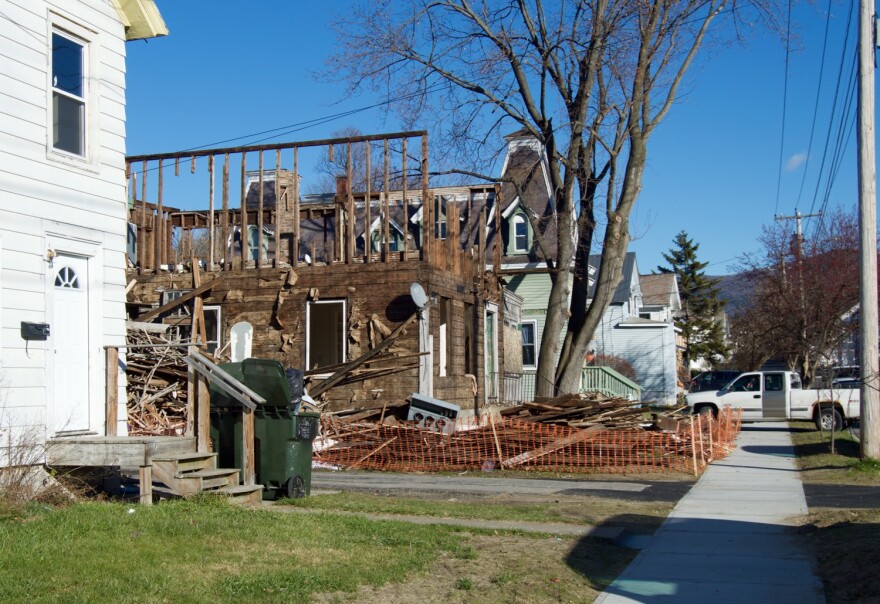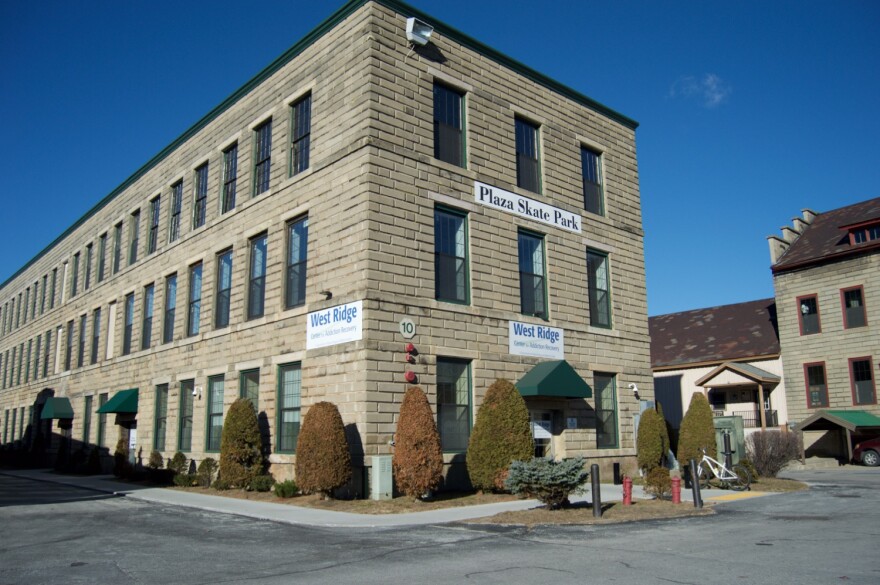State officials say more heroin is coming into Vermont than ever, and the ripple effects are disturbing.
A little over three years ago, Rutland began a multi-pronged, community-wide effort to fight opiate addiction, reduce drug-related crime and reclaim hard hit neighborhoods. But what progress, if any, has Rutland made?
The rasping whir of a saw cuts through the quiet in northwest Rutland. Contractor Morgan Overable is replacing the sagging porch on a rundown home on Library Avenue.
It’s one of seven properties purchased by NeighborWorks of Western Vermont. The local housing agency plans to renovate and sell them as affordable single-family housing.
This story is part of State of Recovery, VPR's week-long look at the progress that’s been made in fighting opiate addiction in Vermont and the problems that remain. Read more here.
NeighborWorks and city officials have focused intense renovation efforts on a roughly 12-square block portion of the city that’s been especially hard hit by drugs and crime.
Only about 29 percent of residents in this part of town own their own homes. NeighborWorks and the city are trying to boost that to 50 percent.

Sewers and sidewalks have been repaired; streets re-paved, lighting improved. Green Mountain Power planted 150 trees.
“This has always been kind of the quote-unquote 'shadier' part of town,” says Overable, pointing up and down the street. “But I wouldn’t say that that’s the case anymore. Since we started working on this house, I’ve been watching that at 3 o’clock, the kids start walking down the street. And it’s kind of nice, because it seems so much safer than it used to be.”
Longtime resident Steve McKearin stands on his front porch. “It’s doing a lot better than it was two years ago, three years ago, that’s for sure," he says.

"A lot of drug deals went down on this street," McKearin adds. "You'd see a lot of them and a lot of that's been curbed."
He points to a lot three doors down where a long-vacant house is in the process of being torn down.
“Getting rid of some of these houses with drug addicts in them, squatting in them and getting more single family homes in here ... getting rid of some of these big apartments, and have it be a neighborhood like it used to be when I grew up,” he says. “With lot of kids and good people that take care of each other.”

McKearin and other neighbors say they’ve seen more police on the streets and believe crime is down because of it.
“I’ve seen them walking up and down the streets quite often. The new chief of police was down in this area last week introducing himself,” adds McKearin. “It’s nice.”
Rutland City Police Commander Scott Tucker says crime in Rutland is down. In the last two years, burglaries in Rutland have dropped 60 percent, while thefts, including shoplifting, are down 45 percent. Noise and disorderly conduct complaints have also declined in the last two years.
In that same time period, treatment options for opiate addiction have greatly improved in Rutland. About 750 people are now able to get drugs such as methadone and Suboxone that reduce opiate cravings – treatment that wasn’t widely available in Rutland before.
Bradley GoodHale, a crime analyst with the Rutland City Police Department, says that's played a huge role in reducing crime. “We see those 750 no longer have to commit crimes to feed their addictions because they are now getting treatment," he says.

Local police say they've also changed their approach to drug offenders.
Before 2012, Scott Tucker says police were trying to arrest their way out of the drug problem. “The message that we give out today is that when we are focused on an offender who has created chaos in a neighborhood, we're giving him the message that this community is a caring community. There are resources available if you want to get help to get off your addicted lifestyle."
But Tucker says they make it very clear to offenders that drug trafficking will not be tolerated in the city any longer.
He says staff from Rutland Mental Health, the local women’s shelter, state’s attorneys office and corrections department now have personnel embedded in the police department. Tucker says their input, plus more calls from the community, are helping the police better identify, address and track crimes in the city.

David Kennedy directs the National Network for Safe Communities at John Jay College of Criminal Justice in New York City. He consulted with Rutland, and says lots of cities offer treatment programs and try to improve troubled neighborhoods.
"What is unique about what Rutland did is it stepped back and looked very deliberately at the functioning of how Rutland was now a persistent regional heroin distribution hub," Kennedy says.
And he says police did whatever it took to disrupt that marketplace. “Knowing that people would try to reestablish as dealers," Kennedy says, "there was a very careful process put in place to look for any obvious reemergence of dealing and stop it early. Everything from additional criminal investigations to parking a squad car in front of a house so that nobody would be stupid enough to walk up to the front door and buy heroin.”
And he says at this point, "It looks like Rutland has made a very very serious dent in it. Things are a lot better," he says. But Kennedy believes this approach wouldn’t have worked had Rutland not expanded its treatment options at the same time.

Besides reducing crime, doctors say better treatment options in Rutland are slowing the spread of infectious diseases like HIV and hepatitis. And they say the number of pregnant women with opiate addiction in Rutland has dropped significantly.
But more is still needed. There’s a waiting list for methadone, and not enough doctors in Rutland prescribe Suboxone – which can be labor intensive to prescribe effectively.
Jennifer Stout is the state director of Eckerd, a nonprofit agency that provides family coaching for parents with children in state custody. She believes Rutland needs more in-patient residential treatment centers so that parents who are trying to get clean can stay near their children.

She says Eckerd's Rutland offices currently work with more than 50 families, nearly all of whom are battling addiction. Stout says the waitlist for their services is growing. And, from her perspective, so is the city’s heroin problem.
“Well, it’s probably the newest high we’ve ever seen with people addicted to heroin and other drugs like crack and meth,” she says.
Despite that, Stout believes Rutland's efforts to fight addiction as a community are helping.
“We have a lot of collaborative agencies in this area who talk to each other, who are working with each other, and I think that’s huge," she says. "I think Project VISION is a big part of how that came about, where people are sharing information and sharing resources with each other, which I think is great.”

Project VISION is a grassroots effort that formed more than three years ago in direct response to the heroin crisis.
Its nearly 300 members include: local officials, law enforcement, nonprofits, neighborhood activists, service organizations and church groups – pretty much anyone who wants to make Rutland better.
Sixty to 80 people regularly attend the monthly meetings. While there’s plenty of chit-chat and laughter, committees tackle tough problems having to do with policing, neighborhoods, employment, housing and addiction.
Bradley GoodHale meets with members of the law enforcement committee and explains how college interns are helping to make crime data available to police in real time. He presents end-of-year statistics that show the city has met Project VISION's goals for reducing drug related crimes. But he admits aggravated assaults, including domestic violence, are up.
“So now we’re looking at, can we take the model that we’ve used to help drive down the crime numbers related to heroin addiction? To drive down the violence numbers? And that’s something we’re working on now," he says.
Patricia Lancaster, a former public defender in Rutland, likes how Project VISION brings so many people together. “To be able to come somewhere where you know the guy next to you has different politics than you, but wants to see revitalization and believes that maybe this really is something that can work – it’s really powerful," she says.
Housing advocate Mary Cohen says Project VISION energizes her. "It just feels good to be here. It feels good to notice change, and when you notice change its like a flywheel, the more you want it to happen.”

Rutland Mayor Chris Louras says the fact that people remain so committed to Project VISION and its mission is powerful. But he admits the city’s fight against addiction and its ripple effects will be a marathon, not a sprint.
“You can’t declare victory and go home," says Louras. "We need to fully institutionalize the change in culture of this community, the change in culture of the police department and the change in culture with our non-traditional partners. So that’s why we need to keep having these meetings.”
Other communities in and out of Vermont are taking note of Rutland’s approach and the positive impact it’s had. City officials spoke at FBI headquarters in Washington, D.C., and at a conference in Chicago hosted by the International Association of Chiefs of Police. Louras has spoken to the state legislature in New York and says Massachusetts lawmakers have also expressed interest.





